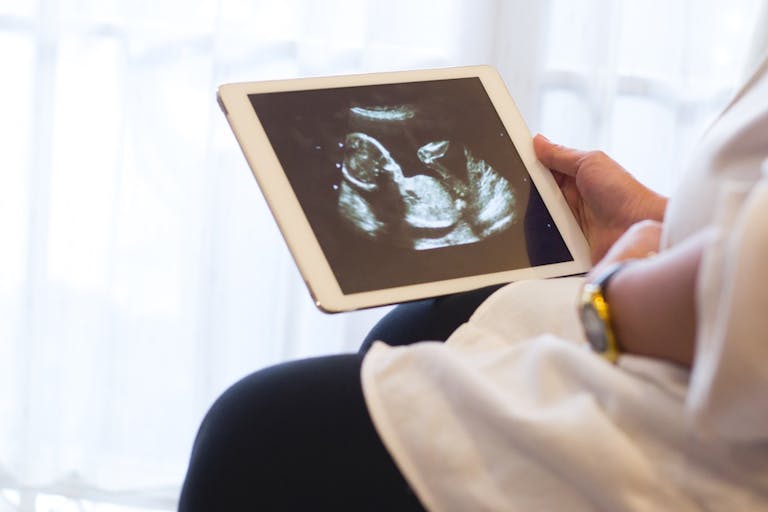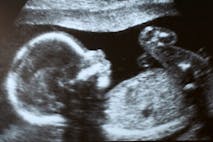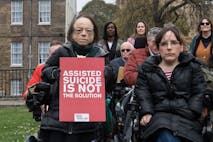
Christian college allows pro-life club after resolving 'misunderstanding'
Bridget Sielicki
·
Pro-abortion medical students launch dishonest attack on pregnancy resource centers
Pregnancy resource centers (PRCs) are among the biggest threat to the abortion industry. Rather than reinforcing the notion that an unplanned pregnancy is life-ruining and abortion is the only thing that can save you, PRCs help give expectant mothers support and resources that can help her choose life. So it’s not surprising that abortion activists would attack them.
In an op-ed for the Pennsylvania Capital-Star, two pro-abortion medical students, Hannah Herbert and Marissa Baron, wrote numerous falsehoods in an effort to convince readers that PRCs should not receive state taxpayer funding. The problem is, Herbert and Baron merely recycled old lies which have long been debunked.
The authors cited the debunked Turnaway Study, which claims that over 90% of women who undergo abortions do not regret it five years later. “The Turn Away Study from Advancing New Standards In Reproductive Health (ANSIRH) documents harms experienced by people who were denied wanted abortions,” they wrote. “These harms include being four times more likely to live below the federal poverty level and being more likely to experience serious complications from the end of pregnancy, among others.”
There were numerous problems with this study. First, it used an incredibly biased sample — only 27% of the thousands of women even agreed to participate. Participation further dropped to 17% in the study’s final year, showing that the study can in no way possibly represent a majority of post-abortive women. The women were recruited specifically by the abortion industry itself, and yet, less than 60% of them bothered to respond to the survey five years later. How many of these countless women, who dropped out of the study or didn’t respond, did regret their abortions, or had negative experiences? We will never know.
Furthermore, though abortion advocates cite the study to “prove” that not having an abortion curses women to pregnancy complications and poor economic outcomes, an analysis proved that false, too. In fact, abortion didn’t yield any statistically significant benefits in income, employment, or public assistance.
Meanwhile, the questions offered the women were not exactly designed to dive deep into the nuanced emotions post-abortive women may be feeling. Women were asked one question: if they felt their abortion was “right” for them, with possible answers of “yes,” “no,” or “uncertain.” That was the entire basis of determining that over 90% of women don’t regret their abortions — and it’s this useless study that Herbert and Baron use to attack PRCs.
This isn’t science. It’s propaganda.
One of the more mind-boggling claims made by Herbert and Baron is that PRCs can’t be trusted… because the abortion industry says so.
“Undercover investigations led by the National Abortion and Reproductive Rights Action League (NARAL) have documented numerous patient horror stories from women who have visited CPCs across the country,” they wrote. “These women reported being confronted with intentionally inaccurate ultrasound dates to encourage them to ‘wait to make a decision,’ false allegations about the ‘pain they would be putting the baby through,’ and even claims that family members would be called and informed of patients’ decisions. These investigations also describe CPCs spreading falsehoods about birth control, unsupported claims about severe depression resulting from receiving an abortion, and lies regarding health risks and compromised future fertility after abortions.”
“CPCs are infamous for their utilization of scare tactics with the intention of frightening women into either carrying their pregnancy to term or delaying abortion care,” they concluded. Yet we’re supposed to trust people who ignore the glaring conflict of interest in an investigation of abortion alternatives, carried out by the abortion industry?
READ: How pro-life pregnancy centers can survive public attacks from abortion advocates
Unsurprisingly, the NARAL investigation into PRCs has likewise been debunked, including in a three–part analysis by Live Action News. NARAL’s claims that PRCs are “deceitful,” for example, were labeled as such because PRCs don’t explicitly call themselves “pro-life” on their websites or literature, even though the overwhelming majority do specifically say they do not commit or refer for abortions.
Other claims by NARAL, such as the so-called “scare tactics” surrounding abortion, are based in truth. Women are still dying from abortions; even more are injured. The abortion industry repeatedly claims abortion is virtually risk-free, but this is a blatant lie. There are risks to abortion, including depression and suicidality — and as future doctors, Herbert and Baron should know that telling their patients the risks of any procedure is the most basic requirement of informed consent.
Article continues below
Dear Reader,
Have you ever wanted to share the miracle of human development with little ones? Live Action is proud to present the "Baby Olivia" board book, which presents the content of Live Action's "Baby Olivia" fetal development video in a fun, new format. It's perfect for helping little minds understand the complex and beautiful process of human development in the womb.
Receive our brand new Baby Olivia board book when you give a one-time gift of $30 or more (or begin a new monthly gift of $15 or more).
If PRCs point out that preborn babies can feel pain, they are telling the truth. The latest research reveals preborn babies are capable of feeling pain much earlier than previously expected, almost certainly by the end of the first trimester. Other research has shown they may be pain-capable as early as eight weeks.
As for the claim that PRCs prevent women from getting an abortion until it’s too late, virtually every state’s late-term abortion ban includes the incredibly vague “health of the mother” exception, meaning if a doctor rules that the abortion is necessary for health reasons, those bans can be skirted. Abortionists George Tiller and Kristen Ann Neuhaus are two notorious examples of the abuse of such exceptions, with Neuhaus exploiting and rubber-stamping false “mental health exceptions” for Tiller’s practice so he could commit late-term abortions on women, regardless of whether they actually had health reasons.
Herbert and Baron also tried to smear PRCs as dishonest, unethical organizations which don’t actually do anything to help women. “Crisis Pregnancy Centers (CPCs) are anti-abortion organizations that claim to help pregnant people though they have been shown to utilize misinformation to coerce, deceive, and manipulate women,” they wrote, adding, “While CPCs often intentionally pose as healthcare organizations, they are typically not qualified to provide any form of medicine and do not follow the standards that are so ingrained in our education. Rather, they shame and judge women for exploring alternative choices to continuing their pregnancy and often tell barefaced lies to promote their organizations’ agenda.”
They further claimed, “Crisis Pregnancy Centers have been shown to hurt women through lies, deception, and betrayal of trust. Many are purposefully designed to appear as full-service clinics and aim to lure in vulnerable pregnant women who they label as ‘abortion minded… ‘ They encourage trust through their false offers of education and support while sometimes going to extreme lengths to prevent unsuspecting women from accessing abortion services.”
The truth is that PRCs offer far more support and help to women and their children than any abortion facility. Planned Parenthood is the nation’s largest abortion chain, yet it offers a minuscule amount of prenatal care and no material support for women who don’t want to have abortions. In fact, they won’t even give a pregnant woman an ultrasound unless she plans to abort.
READ: Another day, another fictional attack on the work of pregnancy centers
Some PRCs, such as the Atlanta Morning Center (ATLMC), Obria Medical Clinics, and the Mother of Mercy Medical Clinic, do provide comprehensive prenatal and postpartum medical care. The National Institute of Family and Life Advocates (NIFLA) has likewise helped over 1,000 PRCs convert to medical clinics which must comply with all local legal and medical guidelines.
Other organizations provide aid besides medical care. Let Them Live gives financial support to help mothers pay their rent, utilities, and other bills. There are also countless maternity homes, like Foundation House Ministries, Good Counsel Maternity Homes, and many more, which give homeless pregnant mothers a place to live. Even more PRCs connect women with local resources, helping them to sign up for WIC and Medicaid, as well as offering support through donations given to the centers. PRCs often supply pregnant mothers with necessities like diapers, baby clothes, furniture, car seats, and more to ensure they have what they need to provide for their children. Still more offer counseling, financial literacy classes, and parenting help.
But all of this good work is overlooked, simply because PRCs don’t refer for or commit abortions.
It’s not surprising that pro-abortion medical students — listed as members of Medical Students for Choice — who say they plan to become OB/GYNs, would oppose organizations dedicated to giving women the opportunity to choose life. Women who choose life threaten the abortion industry’s bottom line, and that’s what matters to them.
It isn’t about what’s best for women and it isn’t about giving women actual choices; if it was, organizations who offer women other alternatives wouldn’t pose any threat at all.
“Like” Live Action News on Facebook for more pro-life news and commentary!
Live Action News is pro-life news and commentary from a pro-life perspective.
Contact editor@liveaction.org for questions, corrections, or if you are seeking permission to reprint any Live Action News content.
Guest Articles: To submit a guest article to Live Action News, email editor@liveaction.org with an attached Word document of 800-1000 words. Please also attach any photos relevant to your submission if applicable. If your submission is accepted for publication, you will be notified within three weeks. Guest articles are not compensated (see our Open License Agreement). Thank you for your interest in Live Action News!

Bridget Sielicki
·
Analysis
Angeline Tan
·
Analysis
Cassy Cooke
·
Politics
Madison Evans
·
Opinion
Nancy Flanders
·
Investigative
Carole Novielli
·
Analysis
Cassy Cooke
·
International
Cassy Cooke
·
International
Cassy Cooke
·
Politics
Cassy Cooke
·
Pop Culture
Cassy Cooke
·